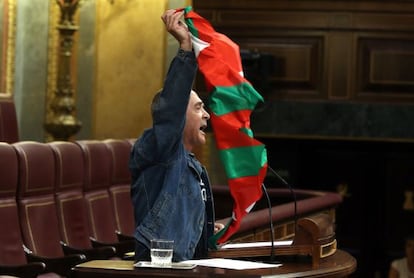Congress votes in favor of abdication law
Leftist and nationalist forces express vehement opposition to handover of throne

Congress on Wednesday voted in favor of a law enabling King Juan Carlos to officially abdicate in favor of his son Felipe.
The bill passed with a wide majority thanks to support from the ruling Popular Party (PP) and the main opposition Socialists (PSOE). In total, there were 299 votes in favor, 19 against, and 23 abstentions.
The vote was concluded shortly before 1pm, via a rare roll call vote in which deputies had to stand and call out yes, no or abstention. A few deputies from the radical Basque group Amaiur, which wants independence for the northern region, walked out in protest.
Other opponents of the law remained but issued vehement “nos” to express their discontent, including the leftist Izquierda Abierta deputy Gaspar Llamazares, who yelled out: “For democracy and for the Republic I vote no!”
The fast-track legislation was necessary to ensure a smooth handover of the crown following the monarch’s surprise announcement on Monday of last week. Despite the monarch’s 39 years on the throne, no specific rules existed for such an event.
For democracy and for the Republic I vote no!” Izquierda Abierta deputy Gaspar Llamazares
But the situation brought to the fore more republican sentiment than had been previously seen in Spain. While Catalan, Basque and Galician nationalists were expected to vote against a continuation of the monarchy because of the state centralization that it symbolizes, unexpected voices of dissent have emerged within the mainstream Socialist Party (PSOE) and others. Two PSOE deputies ultimately broke rank in Wednesday’s vote: Odón Elorza, who abstained, and Guillem García, who was not present. Both will now be fined €400 for breaking party discipline.
In a heated three-hour debate that pitted monarchy against republicanism, and federalism against centralism, many deputies demanded more democracy but differed on what such a thing entails.
Representatives of small nationalist parties used their time on the podium to list their grievances against Madrid and demand a republic for their particular regions.
“I proclaim the Catalan Republic,” said Alfred Boch, spokesman for the Catalan Republican Left, quoting party founder Françesc Maciá. Rather than a unilateral declaration of independence, Boch said he meant to underscore that in all this time “we have made no progress.”
Boch also demanded the right to a referendum on the form of government because “it is really strange that a head of state cannot be voted on.”
“It is incomprehensible for aristocrats to take turns at the head of a state. Changing crowns does not cure a headache. Nations cannot be inherited, we are not property. We are several sovereign nations. Nobody can say they are more sovereign than others,” he said, in reference to the Catalan nationalists’ independence drive and popular referendum scheduled for November.
Meanwhile, the Basque Nationalist Party (PNV) said it would abstain and called for constitutional reform.
Spokesman Aitor Esteban criticized the future king for planning to wear his military uniform to his own coronation, which he said offers an old-fashioned vision of the monarchy that is not democratic.
Support for the monarchy came from Rosa Díez, leader of the small center party Union, Progress and Democracy (UPyD), who noted that “what we are voting on today is not between a monarchy or a republic. Today we vote whether to respect the Constitution or not. The form of state is not so important. The essential thing is the quality of democracy.”
But a recent poll conducted for EL PAÍS showed around 62 percent of Spaniards support a referendum on the form of government.
Years of putting up with the crisis, constant corruption scandals, growing disaffection with the ruling elites and a newfound sense of empowerment through the social media seem to have pushed a generally apathetic population into more active political participation.
On the day of the king’s announcement, around 20,000 people filled Sol Square in Madrid to demand the right to a referendum to vote on Spain’s form of government. The demonstration was organized in a matter of hours through Facebook, Twitter and other social networks, and did not have the necessary permits from the authorities.
Tu suscripción se está usando en otro dispositivo
¿Quieres añadir otro usuario a tu suscripción?
Si continúas leyendo en este dispositivo, no se podrá leer en el otro.
FlechaTu suscripción se está usando en otro dispositivo y solo puedes acceder a EL PAÍS desde un dispositivo a la vez.
Si quieres compartir tu cuenta, cambia tu suscripción a la modalidad Premium, así podrás añadir otro usuario. Cada uno accederá con su propia cuenta de email, lo que os permitirá personalizar vuestra experiencia en EL PAÍS.
¿Tienes una suscripción de empresa? Accede aquí para contratar más cuentas.
En el caso de no saber quién está usando tu cuenta, te recomendamos cambiar tu contraseña aquí.
Si decides continuar compartiendo tu cuenta, este mensaje se mostrará en tu dispositivo y en el de la otra persona que está usando tu cuenta de forma indefinida, afectando a tu experiencia de lectura. Puedes consultar aquí los términos y condiciones de la suscripción digital.








































